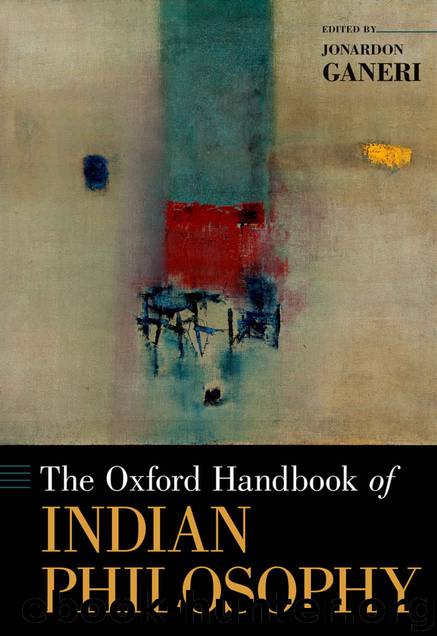The Oxford Handbook of Indian Philosophy (Oxford Handbooks) by Jonardon Ganeri

Author:Jonardon Ganeri
Language: eng
Format: azw3, epub
Publisher: Oxford University Press
Published: 2017-10-11T16:00:00+00:00
CONCLUSION
Kamalaśīla thus concludes in a way that makes clear, again, the extent to which he is always thinking within a tradition—the extent, that is, to which philosophy is for him always to be understood in connection with the essentially hermeneutical task of rightly interpreting the authoritative teachings traditionally attributed to the Buddha. It clearly matters to Kamalaśīla, as a Buddhist thinker, that his arguments be intelligible as cogent exegeses of Buddhist sūtras. We have seen, however, ample reason to think that this does not represent a constraint on his ingenuity or on his originality as a philosophical thinker. In the first of his three texts entitled Steps of Cultivation, Kamalaśīla deftly accomplishes a range of complexly interwoven tasks: Consolidating his win in the famous Samye debate that’s traditionally taken to have occasioned the text, he argues that Buddhist awakening can result only from the achievement of a gradually progressive series of insights—a point reflected in his philosophical view that Yogācāra thought is a necessary prerequisite to understanding Madhyamaka. At the same time, he indexes the traditionally Buddhist schema of three progressively deeper degrees of “wisdom” to the tasks of exegesis and philosophy, showing, for example, how the “wisdom consisting in reflection” amounts to exercising philosophical reason to secure one’s proper interpretation of scripture—and this provides the content that is to be made real by “cultivation.” Indeed, he shows that good philosophy is a necessary prerequisite to the cultivation of the tradition’s insights, recurrently emphasizing the importance of bringing practices of cultivation to bear on the right insights. Finally, and perhaps of greatest interest philosophically, he shows how one of the Buddhist tradition’s most famous arguments for idealism can be further pressed to show that idealism, too, ultimately fails to withstand analysis. And all the while, he keeps hermeneutical considerations ever in view, always representing his incisive and original philosophical arguments as answerable to (indeed, as interpretations of) the teachings of the Buddha—answerable to scriptural passages, more precisely, that he seems to have selected precisely because they are widely taken by the tradition as recommending just the Yogācāra conclusions he finally aims to overcome.
Whatever the historical status, then, of Kamalaśīla’s famous debate with a Chinese proponent of Ch’an, the mythic status of that story—foundational for the self-understanding of many if not most Tibetan traditions of Buddhist thought—is worthily reflected in Kamalaśīla’s rhetorically brilliant Steps of Cultivation. Among the many lessons of this fascinating text is that for someone like Kamalaśīla to have been an essentially Buddhist philosopher is not for him to have been any less a philosopher. Here, clearly, is a subtle thinker of striking originality—one capable of seeing in a religiously significant occasion (that of a royal request to consolidate his debate position’s case for a necessarily gradual path to awakening) the value and necessity of performatively exemplifying skillfully done philosophy. Given how historically interesting this text intrinsically is in virtue of its occasion, it is impressive that it is finally even more interesting for its deployment of a classically idealist line of argument against idealism.
Download
The Oxford Handbook of Indian Philosophy (Oxford Handbooks) by Jonardon Ganeri.epub
This site does not store any files on its server. We only index and link to content provided by other sites. Please contact the content providers to delete copyright contents if any and email us, we'll remove relevant links or contents immediately.
The remains of the day by Kazuo Ishiguro(7625)
Tools of Titans by Timothy Ferriss(7025)
The Black Swan by Nassim Nicholas Taleb(6263)
Giovanni's Room by James Baldwin(5980)
Inner Engineering: A Yogi's Guide to Joy by Sadhguru(5952)
The Way of Zen by Alan W. Watts(5848)
The Six Wives Of Henry VIII (WOMEN IN HISTORY) by Fraser Antonia(4834)
The Power of Now: A Guide to Spiritual Enlightenment by Eckhart Tolle(4814)
Astrophysics for People in a Hurry by Neil DeGrasse Tyson(4658)
Asking the Right Questions: A Guide to Critical Thinking by M. Neil Browne & Stuart M. Keeley(4645)
12 Rules for Life by Jordan B. Peterson(3801)
The Ethical Slut by Janet W. Hardy(3554)
Skin in the Game by Nassim Nicholas Taleb(3521)
Housekeeping by Marilynne Robinson(3465)
The Art of Happiness by The Dalai Lama(3426)
Double Down (Diary of a Wimpy Kid Book 11) by Jeff Kinney(3317)
Skin in the Game: Hidden Asymmetries in Daily Life by Nassim Nicholas Taleb(3306)
Walking by Henry David Thoreau(3266)
Ikigai by Héctor García & Francesc Miralles(3228)
